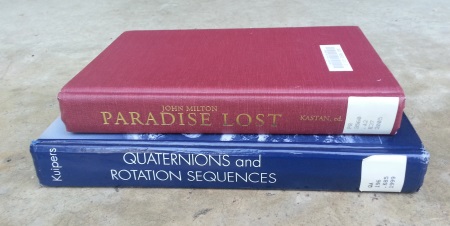You’ve probably heard someone ask someone else what books they would take to a deserted island. It’s usually implied that you’re bringing books for pleasure, not books that would help you survive on the island or leave it.
People often answer the question with a list of their favorite books, perhaps skewed in favor of long books. But I don’t think you should take books that have been your favorites in the past. You should take what you think would be your favorite books on a deserted island. I expect my tastes there would be very different than they are in my current suburban life.
I think of books that I could only read on a desert island, books that I’ve enjoyed in small portions but ordinarily would not have the patience to read cover-to-cover. For example, I’ve found portions of Donald Knuth’s series The Art of Computer Programming enjoyable and useful, but I can’t say I’ve read it all. Perhaps on a deserted island with little to do and few distractions I’d enjoy going through it carefully line by line, attempting all the exercises. I might even learn MMIX, something I can’t imagine doing under ordinary circumstances.
Along those lines, I might want to take some works by Thomas Aquinas such as his Summa Theologica or his commentaries on Aristotle. The little I’ve read of Aquinas has been profound, and more approachable than I expected. Still, I find it hard to read much of him. Alone on an island I might take the time to read him carefully.
For math, I might want to take Spivak’s differential geometry series, depending on how long I expect to be on this island. If I’m going to be there too long and I’m limited on books, I might want to take something else that’s more dense and less familiar.
For science, I’d take Gravitation by Misner, Thorne, and Wheeler. I’ve intended to read that book for many years and have started a couple times. In college I couldn’t afford this price; now I can’t afford the time.
For fiction, I’d take Patrick O’Brian’s Aubrey/Maturin series because I haven’t read it, I’ve heard it is very well written, and it’s long.

